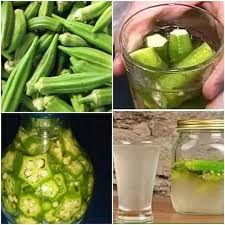Okra or Okro, Scientifically known as Abelmoschus esculentus, is known in many English-speaking countries as ladies’ fingers or ochro. This plant is a flowering plant in the mallow family. It is valued for its edible green seed pods. The geographical origin of okra is disputed, with supporters of West African, Ethiopian, and South Asian origins.
Because okra is loaded with potassium, vitamin B, vitamin C, folic acid, and calcium, it contains more vitamins and minerals than many other foods. It has little calories, and a lot of fiber, and it might even be powerful enough to use as a tool to keep blood sugar at bay in people with diabetes, according to the CDC.
We can go on and on about okra’s nutritional benefits—there are plenty to go around—but the most important thing to keep in mind is how you go about eating the okra.
Drinking “okra water” is a popular new method of using okra. Some have even suggested that drinking it helps lessen diabetes symptoms. Many people use okra in soups, stews, and gumbo due to the thickening gel inside okra. It thickens up soups and make them more creamy, delicious, and healthy than others. Another great way to add it to your diet is to make pickled okra. Not only does this make the taste more flavorful (especially if you like that briny flavor), as many find it to have somewhat of an odd taste and texture. It makes the taste less biter and the peel softer as well. SEE: Can Okra Water Boost Ovulation?
Okra Water Side Effects You Should Know
Despite the many benefits of Okra, eating too much okra can adversely affect some people. The side effects of okra water include;
Gastrointestinal problems: Okra contains fructans, which is a type of carbohydrate. Fructans can cause diarrhea, gas, cramping, and bloating in people with existing bowel problems.
Kidney stones: Okra is high in oxalates. The most common type of kidney stone consists of calcium oxalate. High oxalate foods, such as okra and spinach, may increase the risk of kidney stones in people who have had them previously.
Inflammation: Okra contains solanine, which is a toxic compound that may trigger joint pain, arthritis, and prolonged inflammation in some people. Potatoes, tomatoes, eggplant, blueberries, and artichokes also contain solanine.
Blood clotting: Vitamin K helps the blood clot, and okra’s high vitamin K content may affect those who use blood-thinning drugs, such as warfarin or Coumadin. Blood thinners help prevent the formation of blood clots that can lead to a stroke or heart attack.
People who use blood thinners or who have a risk of blood clots should maintain a regular consumption of vitamin-K-rich foods. SEE: How to Use Okra Water For Diabetes






